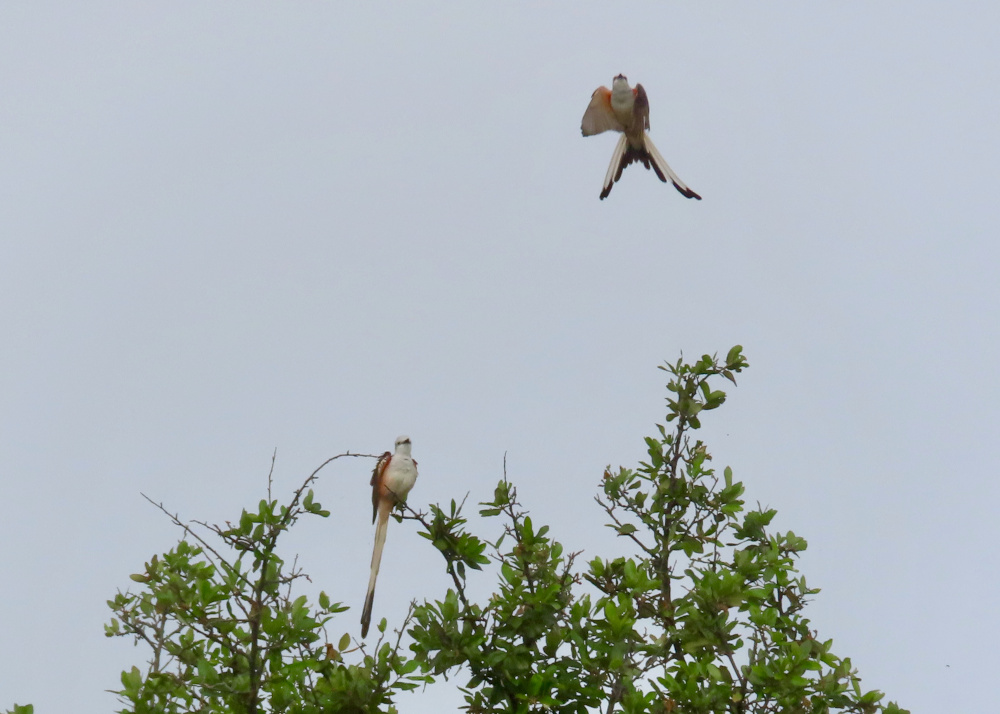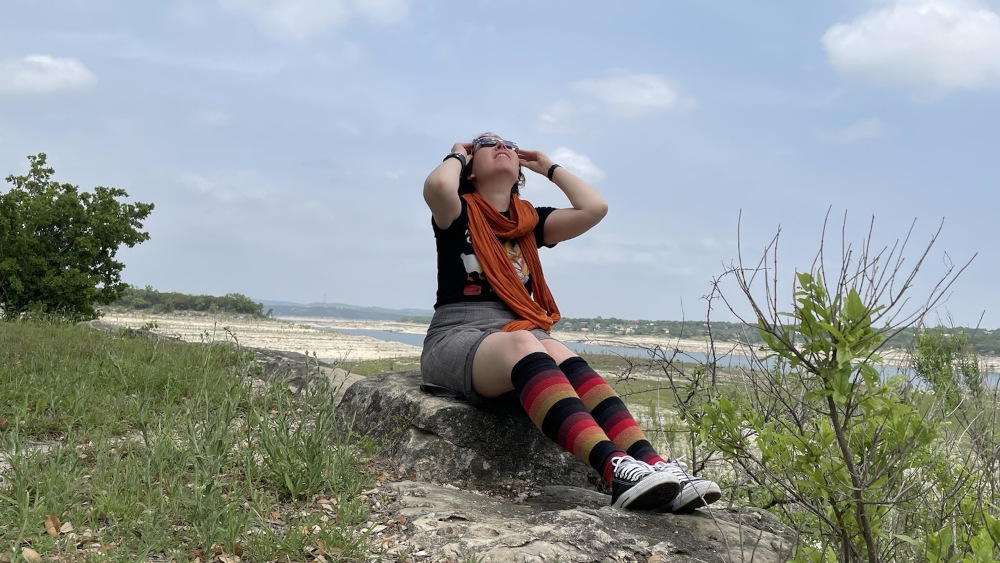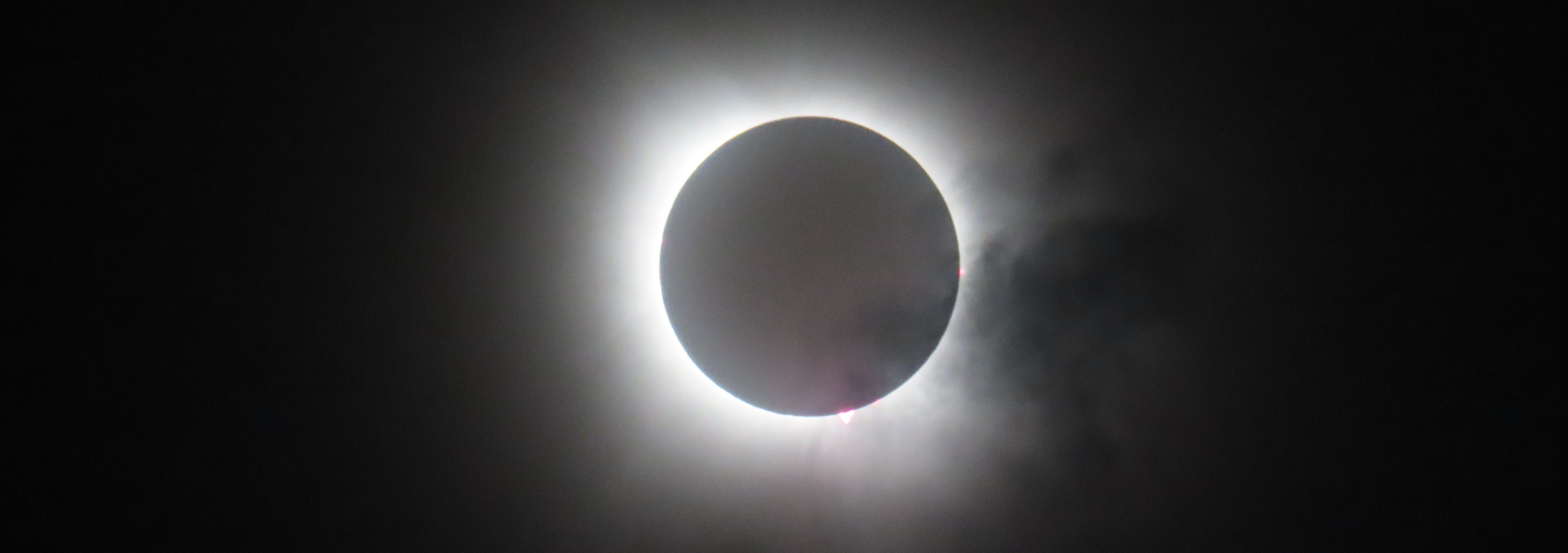Solar eclipse in Hill Country
Staring at the face of God for three and a half minutes
by
About ten minutes before totality, a patch of sky began to clear just around the sun. I laid on the ground and looked up through the eclipse glasses. The crescent sun became a sliver, became a glint--the diamond ring effect--and then, totality! Glasses off. I cried out, something involuntary, I think "AHHHH"--like the cry of pleasure at orgasm.
Getting there #
On the morning of April 8, I was road dad[1], making Paul get up at 5 a.m. We planned to watch from Arkansas Bend Park on Lake Travis in Lago Vista, Texas. It had a longer totality than Austin, and you could book a day use reservation for the eclipse.
But hardly anyone was on the road, and we stopped for coffee at 6:30 and waited until a bit after 7. to get into the park. Like Travis County, which had even declared a state of emergency so they could access additional resources to deal with crowds, we were over-prepared. It might easily have gone otherwise if the weather was better. In the days leading up to the eclipse, the weather predictions were unsettled. Thunderstorms loomed in the forecast, and so did heavy clouds. I think that dissuaded a lot of people who might have driven to Travis County.
We were the second car in the park, and extremely over-prepared park rangers guided us to a designated parking spot.
Birds birds birds #
The first thing I did was get out my bird-o-scope and figure out what cute lil' bugger was yelling at the morning. Wait, no, the actual first thing I did was put on bug spray. Then I went about investigating the local birds. The birds were excellent, and completely different than what I'm used to either in San Francisco or New England. Different biome means different birds, naturally, and I think I didn't fully grasp how different the Texas Hill Country is than the dry parts of inland California.
I got a handful of new lifers[2], including the spectacular Scissor-tailed Flycatcher and utterly charming Vermilion Flycatcher. The Scissor-tailed Flycatchers like to yell at each other a lot and do daring fly-bys, so I managed to get some cool photos.

These two Scissor-tailed Flycatchers sat and yelled at each other for a while before doing a series of swoops.
Thus we spent the next five hours loitering pleasantly in the park, examining the wildlife, talking to rangers, eating snacks, and so on. It probably sounds like it would be boring, but it wasn't at all.
We return to your eclipse, already in progress #
Even as we waited for the eclipse, the clouds shifted in the sky. At times, they broke up leaving mostly blue sky, only to gather again. I kept hoping the eclipse effect[3] would work in our favor to thin the clouds. From first contact--when smallest sliver of the sun is blocked from view--to totality took over an hour. For a long time, it wasn't obvious if the eclipse would be visible when it reached totality. Clouds came and went, at times completely obscuring the partial eclipse.

Looking up at the sun through eclipse glasses during the partial phase. My festive No Gods No Masters Untitled Goose Game shirt is obscured by my equally festive orange scarf.
When the clouds cleared in time for totality, it felt like a gift. I laid down on the dry and dusty ground so I could look up better. I got dust on my clothes and burrs in my hair like a naughty dog, but I did not care. I looked away only briefly to try to take an iPhone photo, which came out terrible and the only thing I regret is taking that time to look away. Even so, three and a half minutes felt like an eternity compared to 2017's two minutes in Madras, Oregon. Totality went on and on, but also, it was only a moment.
It was three and a half minutes of the most exquisite beauty, like looking directly at the face of God.
The people in the park all around me also cried out in joy and wonder. Some people cheered. Some sighed. I could hear people far away on boats on Lake Travis also crying out and cheering. It was like this in 2017, too. Not everyone is moved to make a sound, but many people are. And it is no wonder. It is the most beautiful thing I have ever seen. I want to spend the rest of my life seeing as many total solar eclipses as I possibly can.
Convincing people #
In the week leading up to eclipse, I tried to convince everyone I could to travel into the path of totality if they were at all near. Talking about what it's like to see a total solar eclipse to someone who has never seen it is somewhat futile. Too many celestial phenomena have been hyped up which are not particularly interesting. Supermoon? Pffah. You're unlikely to even notice. Lunar eclipse? Cool, but everyone overcooks their photos to make it look a lot more red than it is. Seeing the rings of Saturn or Jupiter's moons? OK, it's genuinely cool but fundamentally a solitary experience. But because of all this crap, when you tell people that totality is singular and absolutely not like anything else, they might disbelieve.
At work, I spoke to a person who was planning on leaving a city in the path of totality just so she could avoid the crowds. I tried to talk her into staying the extra few days. I don't know if she did.
I'm most happy I convinced my parents. They're the kind of people who do cross-country driving trips on a whim, so driving half a day to be in the path of totality wasn't really a big deal, if only I could convince them that totality was worth it. I did, and they had perfect viewing conditions in Vermont.
Vivid perception #
Somehow, this eclipse feels more vivid. Not just because it's more recent, I think. Maybe because I knew roughly what to expect and didn't spend any time being surprised, I was completely absorbed in perceiving what I saw. The sun was a lot more active than in 2017 so the corona was magnificent, and I saw a protuberance around 5 o'clock on the face of the occluded sun. I wondered if it was a solar flare, but it was not. It was a prominence, which is a related phenomenon. It's like a bit of the sun kind of started to ooze out, like for a flare, but it stayed attached to the photosphere instead of streaming out from the sun.
Last time, I spent the half hour before totality in meditation. This time, I did nothing special at all, which seemed to better prepare me to see, to perceive. No meaning put on to it, just perception of what is. And then on reflection, or maybe combined with perception, scientifically informed understanding of what happened physically, materially, orbitally. Dry understanding rather than fanciful double-rainbow-what-does-it-mean shit. Direct perception, or direct as possible, is better to access the beauty than any attempt to see it as spiritual or emotionally meaningful. Simply to perceive with no thoughts, no expectations, spontaneously.
Now that sounds like Dzogchen or Zen again. And maybe it is.
The photo used in the header image and the photo of me watching the eclipse were taken by Paul Mison on April 8, 2024. Used with permission.
I don't know if anyone else uses the term "road dad" the way I have come to. I'm thinking of a Bill Hicks bit where he talks about the dad making the whole family get up really early and drive all day. I wish I could remember enough to have a quote for you. ↩︎
Lifer, meaning a bird on your life list, meaning a bird you've personally seen and identified for the first time in your life. ↩︎
Clouds dissipate quickly during solar eclipses as the land surface cools. Nature. 12 February 2024. ↩︎
